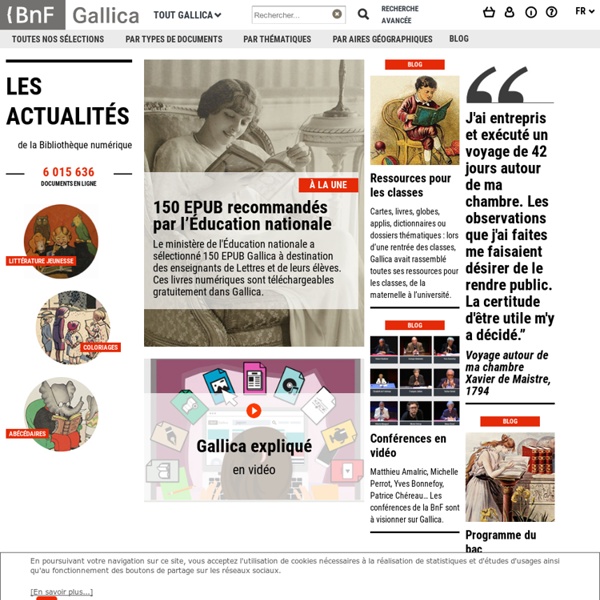



http://gallica.bnf.fr/accueil/
Related: reading • Raccolte • BOOK things • Read, Write, Reflect • LireCommunity Video : Free Movies : Download & Streaming movies eye favorite 12 comment 2 Namaz nasıl kılınır? favoritefavoritefavoritefavorite ( 2 reviews ) Topic: Namaz nasıl kılınır? Free books: 100 legal sites to download literature The Classics Browse works by Mark Twain, Joseph Conrad and other famous authors here. Classic Bookshelf: This site has put classic novels online, from Charles Dickens to Charlotte Bronte.The Online Books Page: The University of Pennsylvania hosts this book search and database.Project Gutenberg: This famous site has over 27,000 free books online.Page by Page Books: Find books by Sir Arthur Conan Doyle and H.G.
Marfa - Judd Foundation Book A Visit Guided visits to Judd Foundation properties in Marfa offer visitors direct engagement with Donald Judd’s art and vision. Judd’s formerly private living and working spaces provide firsthand experience of Judd’s concept of permanent installation in the Chihuahuan Desert. Judd Foundation offers two different guided visits of properties in downtown Marfa, La Mansana de Chinati/The Block, and The Studios. This is your brain on Jane Austen, and researchers at Stanford are taking notes Stanford Report, September 7, 2012 Researchers observe the brain patterns of literary PhD candidates while they're reading a Jane Austen novel. The fMRI images suggest that literary reading provides "a truly valuable exercise of people's brains." By Corrie Goldman The Humanities at Stanford L.A. Cicero
Story Text: The Adventure of the Greek Interpreter - Baker Street Wiki - The Sherlock Holmes encyclopaedia During my long and intimate acquaintance with Mr Sherlock Holmes I had never heard him refer to his relations, and hardly ever to his own early life. This reticence upon his part had increased the somewhat inhuman effect which he produced upon me, until sometimes I found myself regarding him as an isolated phenomenon, a brain without a heart, as deficient in human sympathy as he was pre-eminent in intelligence. His aversion to women and his disinclination to form new friendships were both typical of his unemotional character, but not more so than his complete suppression of every reference to his own people. I had come to believe that he was an orphan with no relatives living, but one day, to my very great surprise, he began to talk to me about his brother. "In your own case," said I, "from all that you have told me, it seems obvious that your faculty of observation and your peculiar facility for deduction are due to your own systematic training."
Notes from Nature People have been collecting specimens from the natural world for centuries - minerals, plants, fungi and animals. Today, there are an estimated two billion specimens housed in natural history museums around the world! These biological collections document where species and populations exist now and where they existed decades and centuries before, so they hold irreplaceable information necessary for uncovering the patterns of changes in species distributions and ecosystem composition over time. Scientists use such data and information in order to address key environmental issues we are facing right now, such as the impacts of climate change and how diseases affect wildlife and humans. For the information held in these collections to be used to its full potential there must be better digital access to these data.
Books with Full-Text Online Abbot Suger and Saint-Denis Gerson, Paula Lieber, ed. (1986) The Academy of the Sword: Illustrated Fencing Books 1500–1800 LaRocca, Donald J. (1998) The Adele and Arthur Lehman Collection Virch, Claus (1965) Better Read than Dead: A Visit to the Martha Rosler Library (by Graeme Thomson & Silvia Maglioni, originally published in CLUSTER January 2008) Parisian book-lovers peeved at the frosty reception and draconian security arrangements of the Bibliothèque nationale de France can, for a limited time, take solace in the somewhat cosier nook provided by the Martha Rosler Library, installed in the Galerie Colbert (Institut national d’histoire de l’art) until Jan 20 as part of a travelling exhibition project. The choice of reading matter may not be quite so vast, but visitors are at least free to finger the spines, delve into and even photocopy pages from any of the library’s 7,600-odd volumes, periodicals and catalogues, many out of print, some quite rare, on subjects ranging from Marxist theory to heraldry, cinema to cookery, Situationism to pattern making. The name itself (not Martha Rosler’s library but the Martha Rosler library) gives some indication of the library’s playfully ambiguous status and of the visitor’s uncertain relation to it. Like this:
The Best Shots Fired in the Oxford Comma Wars The Oxford comma, so-called because the Oxford University Press style guidelines require it, is the comma before the conjunction at the end of a list. If your preferred style is to omit the second comma in "red, white, and blue," you are aligned with the anti-Oxford comma faction. The pro-Oxford comma faction is more vocal and numerous in the US, while in the UK, anti-Oxford comma reigns. (Oxford University is an outsider, style-wise, in its own land.)